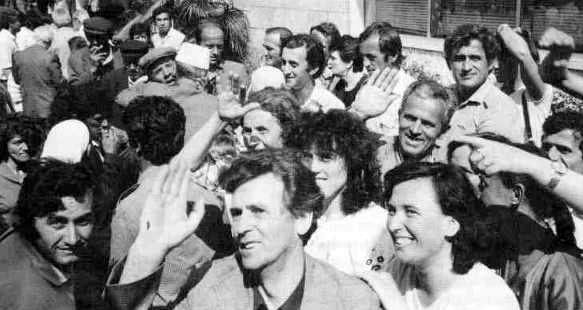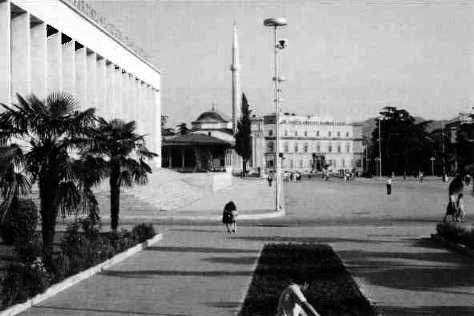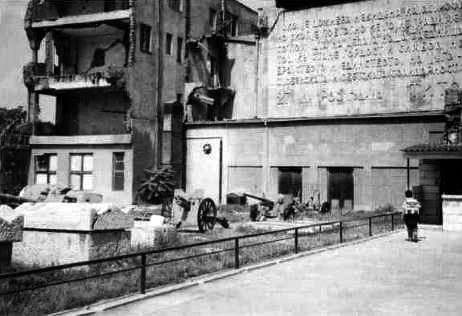![]()
The Words of the Perrottet Family
|
|
The Words of the Perrottet Family |

Tirana,
Albania: Albanians greeting their relatives as they arrive for a
memorable first visit. A little left of center, two elderly relatives
embrace each other in tears. There were many such scenes
Claude Perrottet, his wife Hitoko and two other brothers were visiting our missionaries in a center located in Skopje (Macedonia, Yugoslavia) while awaiting a chance to visit their sister country of Albania. The following account of that visit appeared in the Segye Ilbo, with a shorter version appearing in our European Church Newsletter, vol. 2.
At this time of much publicized Albanian exodus through embassies, another event makes little noise: family reunions. The Albanian situation parallels the Korean or German ones. Yet the reunion is not North-South nor East-West, but inside-outside.
Since 1945, Albania with a population of only three million is just as secluded as North Korea. It has a very bad relationship with neighboring Yugoslavia, where another two million ethnic Albanians are living. Those Albanians from Yugoslavia were not permitted any contact, neither directly nor by phone or letter, with their relatives on the other side of the border since the end of World War II, except for a short time period between 1976 and 1980 when Albanian leader Enver Hodja briefly opened his border with Tito's Yugoslavia.
Though the Albanian state's repressive nature is commonly acknowledged, Albanians in Yugoslavia continually feel homesick for Albania. Not only are they separated from their kinsmen but they are also part of a nationality problem within Yugoslavia.
Kosovo, where most of them are settled, is a province of the Yugoslav Republic of Serbia. Though Albanians now have a 90 percent majority in Kosovo, every key position in public life remains strictly in Serbian hands. The Albanians' strong national drive causes them to organize against Serbia and receive extensive persecution from police. Their recent autonomy claim is causing further confrontations.
It is only since May 1990 that Albanians in Yugoslavia are allowed to embark on brief weekend tours inside Albania.
Participants to those tours could care less about tourism; they go only to see their relatives. And not without difficulties: visas can only be obtained on the afternoon just before the departure date and trip cancellation is commonplace.
Our little group was very privileged to receive our visas for a two-day visit to Albania with a bus full of people of Albanian origin from Yugoslavia. We were one of the very first international groups of this kind to enter Albania and clearly the only foreigners ever to come in this manner.
Even though Tirana, the Albanian capital, is only 150 km away, it is almost a full day's journey. The Macedonian driver with a Stalin-like moustache pulls his shabby old bus along the narrow mountain road built by Austria during World War I and apparently not renovated since.
At the border of the last hardline communist country in Europe, and perhaps the world's most secluded one, we are examined by cold-looking officers in North Korean-like olive green uniforms. The Albanian tour guide warns the group after entering Albania: "No one leaves the bus, we only continue with every single one on board!" We pass by an old factory spewing out pollution, built by Red China in the early sixties. Since the Albanian constitution prohibits foreign loans, real economic development is hardly possible. Aid from China stopped in 1978 when Enver Hodja broke relationships with China, stating Mao's thinking had nothing to do with Marxism.
Albania is incredibly poor; everything is old and dirty. The atmosphere in the cities is oppressive with many people laying on the ground, doing nothing. It is the type of environment everyone would wish to escape.
Albania is the world's only official atheistic state where, until very recently, religious activity would be reason enough for a death sentence. Driving through the town of Elbasan, we encounter the only church building during the entire trip. It has a red star on its top and serves as a horse stable.
As we arrive in Tirana small crowds of relatives are waiting. There are many moving scenes of tearful reunions among relatives embracing each other. The Sigurimi (secret police) do not prevent such meetings but keep watching everyone. Tour participants are not permitted to visit their relatives' homes -- meeting is only permitted in front of the bus. Those relatives lucky enough to find transportation (there are no private vehicles allowed in Albania) keep following our bus in the hope of more time to spend with their kinsmen at the next stop.
Inside the bus, the tour guide knows there is little interest for Albanian propaganda. Apparently guides have ceased doing it altogether. "Shall we have a stop at Enver Hodja's statue?" he suggests. "Nooo!" respond the "tourists" unanimously. Hodja died in April of 1985. Founder of Communist Albania in 1945, he is the Kim II Sung of Albania with an enormous personality cult during his entire reign.
But Tirana's children are miserable. With their clothes shabby and incredibly primitive, they beg for pennies. Stagnation and underdevelopment are rampant. Even in the capital city, phone numbers have only 3 digits.

Tirana,
Albania: There is no private traffic in Albania. As in North Korea,
streets are virtually empty, so people can stand and talk on the
large arteries of the capital, without any danger of being hit by a
car. In the background there is a mosque and minaret tower which are
the only ones in Albania. Built for the tourists, the mosque is not
open for worship
Albanians are fiercely independent and extremely conscious of their own excellence, stressed if not produced by the fact that they have repeatedly been suppressed and trampled upon by their powerful neighbors and ignored by the world. Perhaps even more than North Korea, their pride in self-reliance led them to unwisely cut themselves off from any exchange with the outside world that could have helped them develop.
Our group was proudly led through the National Museum in Tirana and shown various Albanian-made products, ranging from socks and underwear to farmer's tools, that are not only hopelessly outdated but basically low quality. Even a southern Yugoslavian visitor, whose own homeland is quite underdeveloped compared to Western Europe, ironically answered: "Maybe for you this is good," and then shook his head.
Moving around as a private visitor in Tirana was not an easy thing. Today, one is free to go anywhere, but means of transportation do not abound, and it was virtually impossible to receive helpful advice from the population. Finally one of the rare hotel-taxis led us -- for an outrageous amount of money -- to our contact (a university professor), to whom an innocent invitation for an international conference was handed. The professors in Albania said they could not possibly attend such a meeting. The secret police were immediately informed of our visits; we were questioned back in our hotel, but only to confirm our identity as the visitors. The taxi driver had obviously spoken, but we had no idea what happened to the persons we had visited.
My most impressive memory from our stay in Albania comes from a young boy, maybe 17 years of age, who was standing in the middle of a crowd of relatives welcoming their kinsmen from Yugoslavia. As he obviously did not perceive any familiar faces in our group, he just stood there looking fascinated at me and my Oriental wife. A while later, after I offered him a simple piece of chewing gum and we exchanged a long, warm handshake. He expressed through signs that he was sorry he could not give anything in return. On a sudden inspiration, he plucked two flowers and offered them to us. After a few moments, he quietly left.
We were so happy to be able to visit our sister country, and to have pledge service on Sunday morning in Tirana. After two short days, the tour is over; but we became heartistically so close to the Albanian people, especially those who were with us on the bus. Crossing heavy defense barriers, we arrived back at the border for a last long, tedious check by the olive-green uniformed custom officers. Suddenly there was a last boost of emotion: the People's army officer watching over the operation recognized some of his own relatives. Abandoning his cold demeanor, he ran and embraced them with tears. Our bus then departed, leaving the Albanians' hearts homesick... until the following weekend.
The Yugoslavian province of Kosovo is the "other Albania." Located in the south of Serbia, on the border of Macedonia and Albania, it is the largest and most powerful of the six republics forming the Federation of Yugoslavia. Ninety percent of Kosovo's population is ethnic Albanian, but Kosovo is also the historical origin of Serbia.
Serbia considers Kosovo as their own, much as Saddam Hussein considers Kuwait to be a part of Iraq -- for historical reasons and power interests. But the Albanian population totally rejects this idea and constantly rebels against the central power in Beograd. Walking in the streets of Pristina, the capital of Kosovo, even in a relatively quiet time, one can see the Serbian police parading and keeping control of the local people. The population, mostly Islamic, is similar to that of other south and southeast European nations: walking, speaking and living in large groups of relatives and friends. Approaching the modern, even impressive looking buildings of downtown, one discovers everything is run down.
Met at the university, Toni, a rare Karate instructor and student of medicine, confirmed the impression of the visitor: "People have to get out of here to learn how to care and make things nice... Here everything is so oppressive that there is no pleasure in life." Meanwhile, the very young karate students, most of whom cannot afford a real martial arts dress, practice in the background.
A foreign lecturer at the university (who does not want to reveal his name because of security) comments: "It is of course unacceptable for the majority of Albanians to be completely controlled by the Serbians. In the university, for example, practically all staff and students are Albanians, except the President who is Serbian, and does not even speak Albanian! The pitiful thing is that through this, extreme nationalistic tension is generated: a thing this particular area of the Balkans really doesn't need."
The irony is that at a moment when the entire world is looking with a critical eye at the gross human rights violations of Albania, the ethnic Albanians of Kosovo are often attracted by their native country's example of self-reliance, feeling it vindicates the dignity of their people. In some ways, their attitude is reminiscent of that of South Korean students towards the North Korean regime.

Skopje,
southern Yugoslavia (Macedonia): the old railway station, now a
museum about the earthquake that entirely destroyed it in 1963
The capital of Macedonia (also in southern Yugoslavia), which in far distant times was the home of Alexander the Great, has little left of its past grandeur. Far down in the Southeast of Europe, Macedonia is off-center in regard to the recent events in Eastern
Europe Yugoslavia, though famous for being the only Marxist country that opened up to the West long ago, has never really undergone a change of regime like other East European countries.
Though it also has a strong minority of Albanians (usually Muslims and rather poor) the majority of its populace are relatively wealthy Orthodox Macedonians and Serbians. They share little in common, especially no sympathy; mutual contempt is the standard. There is also a large community of Gypsies, mostly Muslim, who live in the most miserable circumstances. The community of Mother Theresa of Calcutta, herself born an Albanian, is doing precious relief work there, as it cannot operate in the founder's home country.
The fading, but long communist rule has left its impact on society, but not to such a degree as in Stalinist Albania. Since January of this year; all restrictions on private enterprise have been lifted, and new shops and businesses are appearing everywhere, from pizza parlors to wood-cutting factories, both small and large.
Until recently, tax regulations made it virtually impossible for anyone to pursue any specific type of business activity for more than two years. As a consequence, after that period of time, the owner of a fashion shop, for example, had to suddenly transform himself into a restaurant manager, or open a dry cleaning shop with a disastrous impact on quality of services. Often, it is the Communist party bosses who have put themselves in good positions, are the first to make use of the new freedoms they have now given becoming the top capitalists.
Maybe the saddest and most unexpected impact of communist rule is the omnipresence of pornography to a degree that shocks even the decadent Westerner. This phenomenon, first prohibited by the party, was then tolerated and even promoted, as it obviously keeps people quiet. People of all walks of life seem to indulge in it quite openly and without the slightest feeling of shame.
All of the above areas, provinces and countries are close to each other. Their populations are mixed, and they are constantly fighting each other for sovereignty, with strong nationalism. The religions are mostly Orthodox and Islam, but now the spiritual foundation has almost disappeared, and there is extreme immorality everywhere.
Albania is of course a little different, because for the last 40 years it has suppressed any visible form of religion, and also does not allow pornography.
Still, the atmosphere has already changed and I never had any feeling of danger for ourselves like in East Germany before the Berlin Wall came down, or in Panmunjom. I am almost certain that Albania will change more very soon. What will then be needed is to bring the country out of its unbelievably primitive state.